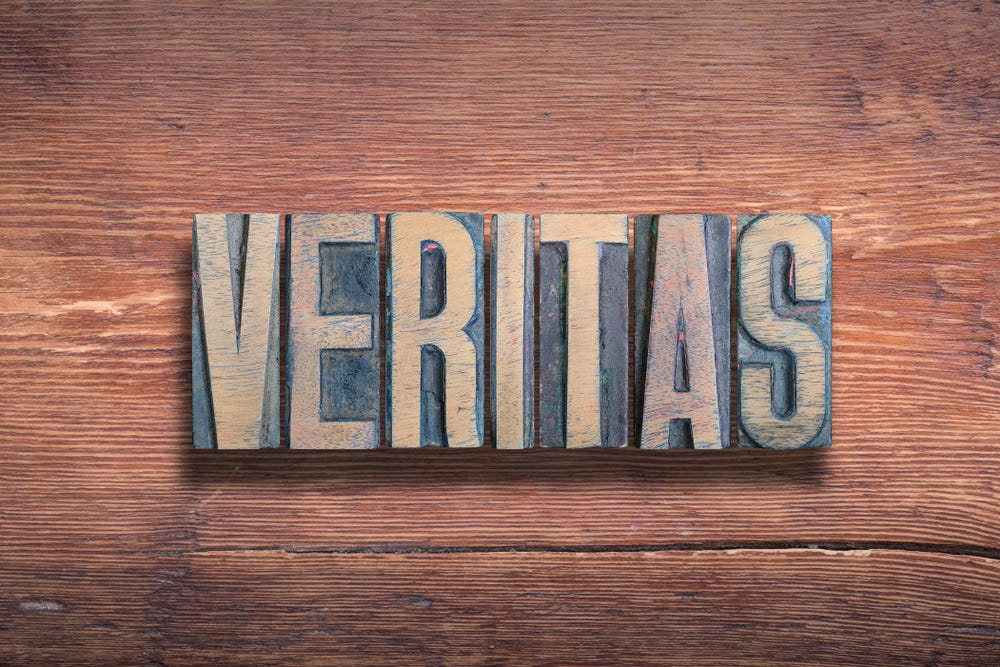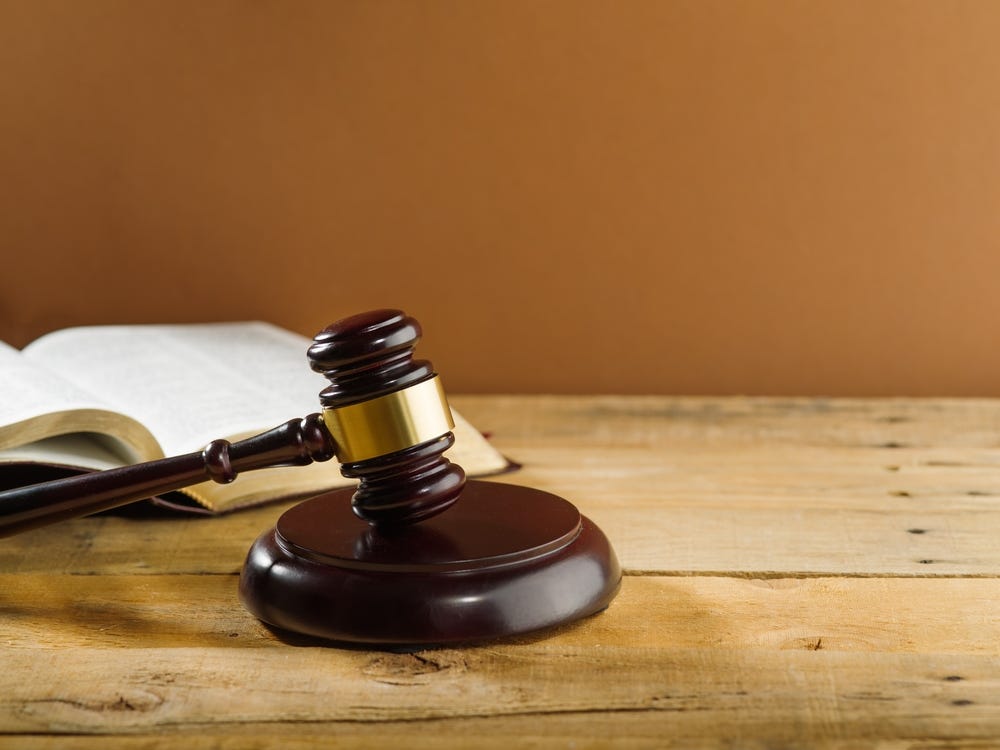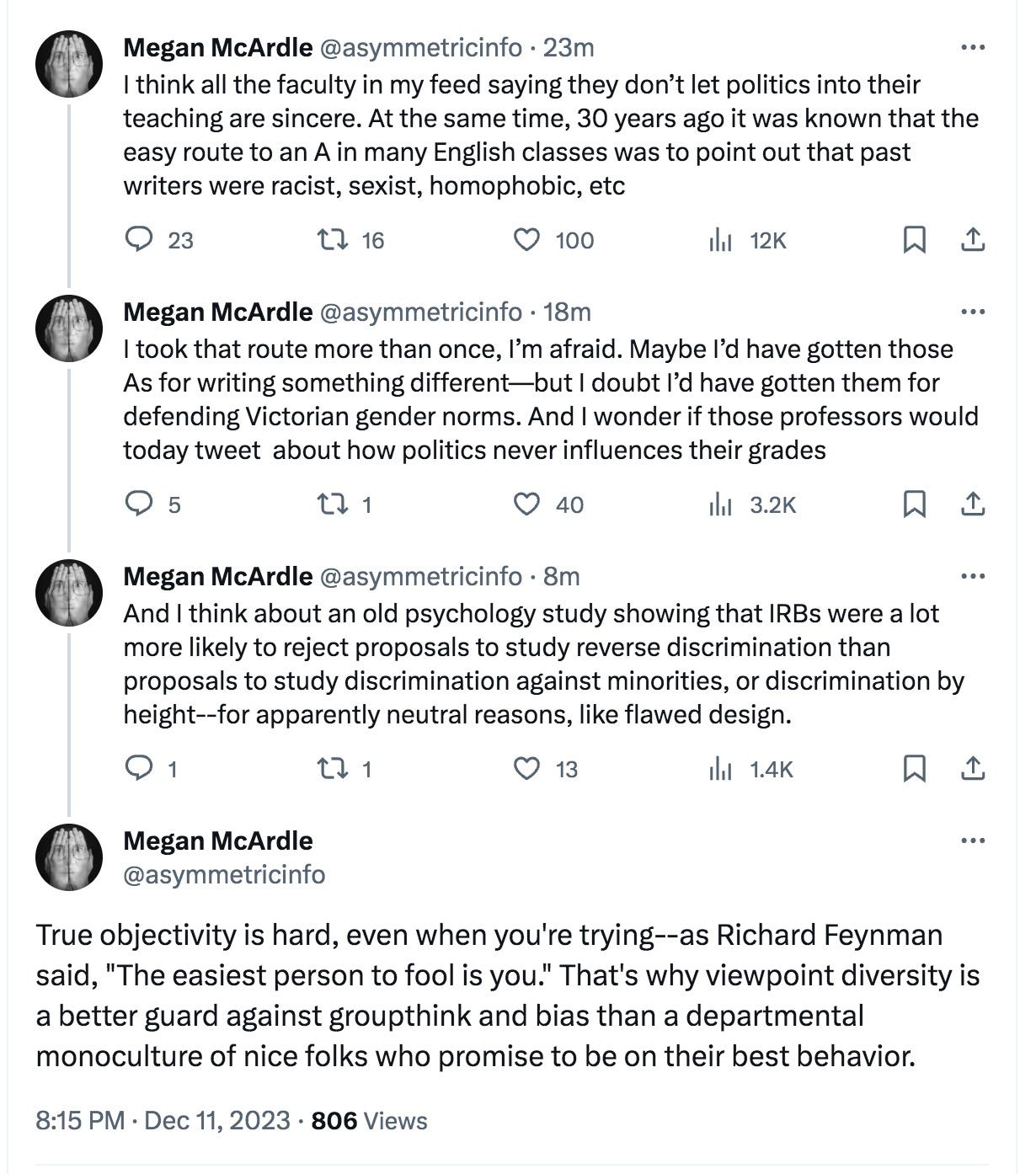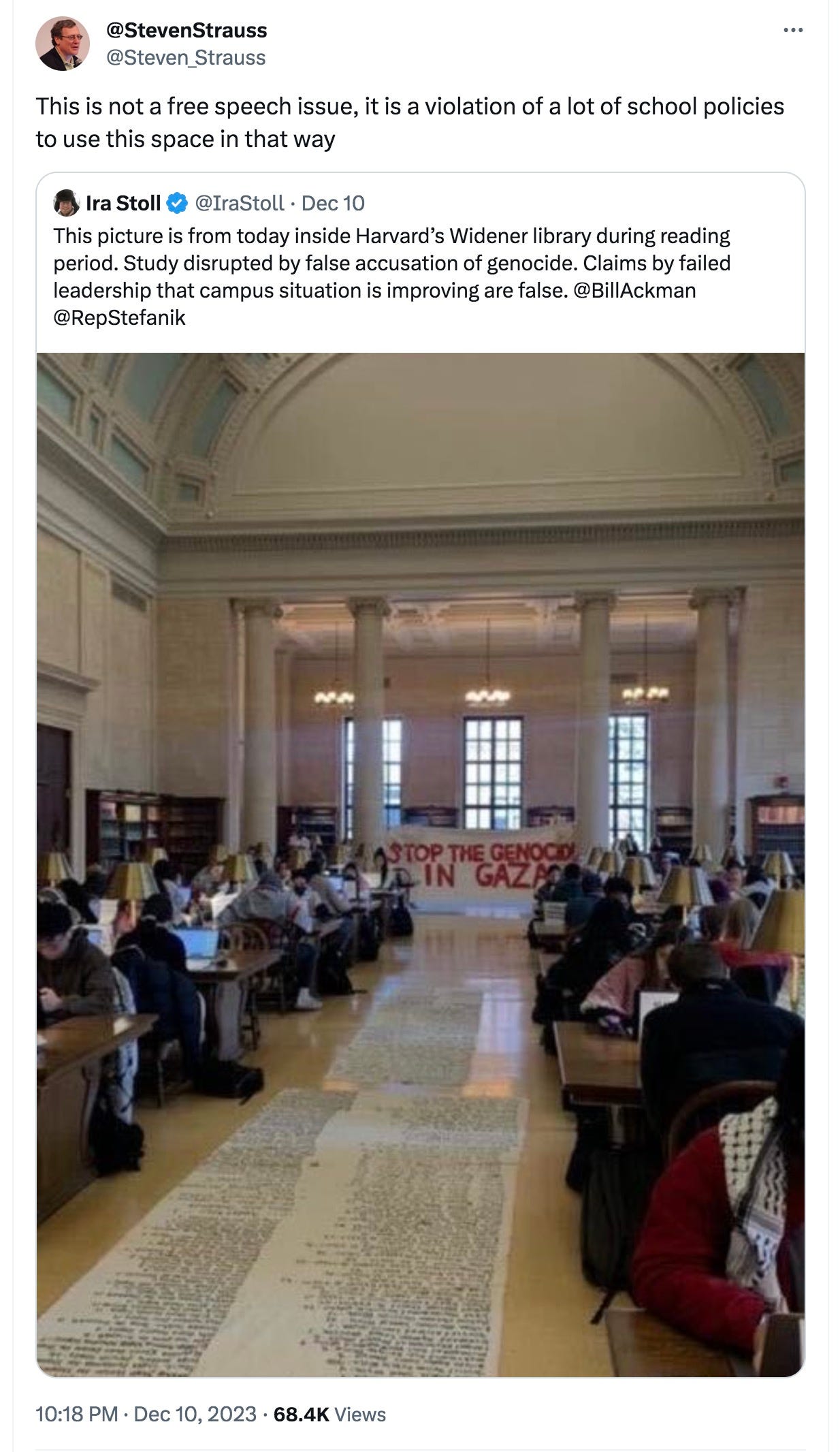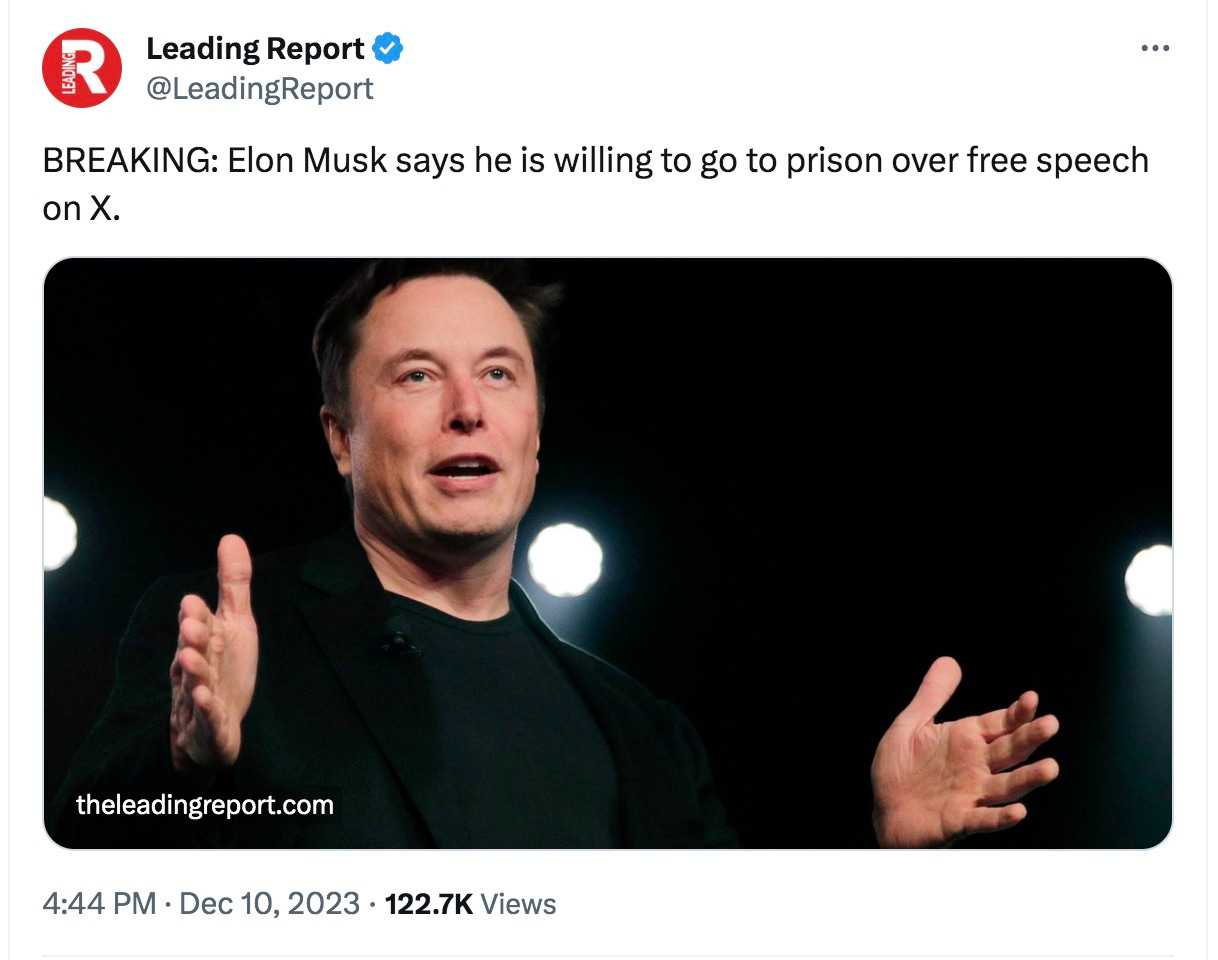E-Pluribus | December 12, 2023
The rise of 'my truth' thinking on campus; Americans want accountability for their leaders; and one cheer for those college presidents....yes, those presidents.
A round-up of the latest and best musings on the rise of illiberalism in the public discourse:
Gerard Baker: Higher Education’s Slide From ‘Veritas’ to ‘My Truth’
The responses of three university presidents to their recent congressional testimony have been roundly criticized for both what they included and what they left out. Gerard Baker at The Wall Street Journal writes that Harvard President Claudine Gay should have left out the reference to “my truth” in her apology.
[Harvard President Claudine Gay] issued a statement that made a straightforward mockery—untruth might be a better word—of what she had said a day before at the hearing. Anyone threatening Jewish students would be “held to account” it said—suggesting that the “commitment to free speech” she touted in Congress was no longer operative now that her job was on the line.
Clearly the damage-limitation squad didn’t think even this volte-face went far enough, and so a little later she gave an interview to the student newspaper, the Crimson. It’s worth reading the whole thing for a valuable insight into the mind of the person who holds the most prestigious job in higher education.
First of all: “I am sorry,” she said. “Words matter.”
Anyone thinking of attending Harvard might like to note that it took the head of that institution more than 48 hours to appreciate that “words matter”—and this after a quarter-century in academia.
More revealing, however, was what came later. As Ms. Gay again contradicted the words she had spoken at the hearing, she explained what had gone wrong. “I got caught up in what had become at that point, an extended, combative exchange about policies and procedures,” she said. “Substantively, I failed to convey what is my truth.”
Few phrases are as reliable as “my truth” for identifying seasoned purveyors of cant and doubletalk. Truth isn’t something that can be identified or modified by a possessive pronoun. If my truth is different from your truth and your truth is different from her truth, these aren’t truths. “My truth” is the device deployed to elevate the particular viewpoint of a member of a particular group or identity, by claiming the validation of the “truth” for a narrow ideological cause.
Read it all.
Hannah Anderson: Advent and the Hope of Divine Accountability
The United States was founded as a protest against unjust rule; indeed, “justice” is mentioned throughout the Declaration of Independence. It seems that deep-seated desire has not dissipated in the intervening centuries. As the Christmas season approaches, Hannah Anderson at The Dispatch muses on the intersection of our broken politics and that age-old desire for government accountability.
In much the same way, Trumpian rhetoric resonates with the desire for government accountability—even if his version of accountability is unfounded. Trump’s 2016 promise to “drain the swamp” caught on only because people believed there was swamp to drain. Curiously, as well, Trump’s desire is not for divine intervention. He’s not calling for God to interrupt the political process or praying for a miracle that would somehow allow him to be president again. He’s claiming God’s authority as a just judge.
But MAGA voters are not the only ones calling for accountability. Earlier this year, progressive voices pressed the Senate to enact a legally binding code of conduct for the Supreme Court in light of recent revelations that Justices Clarence Thomas and Samuel Alito failed to disclose luxury trips.
Our shared loss of trust in government conflicts with our sense of identity and history. After all, the United States began as a protest against unjust rule. Ours was the system that supposedly would halt abuse of power and authoritarianism. Through the miracle of checks and balances, the three branches of government would hold each other accountable. But increasingly we find that our system isn’t working the way we thought it would. We struggle to hold leaders to account. Distribution of power sometimes means the distribution of corruption. This gap between what is and what should be has the potential to undermine the American soul and destroy our imagination for a shared future.
[. . .]
The grim reality is that outside the ballot box, the American public lacks the mechanisms to hold our leaders in check. We are increasingly aware of corruption while also increasingly unable to do anything about it. We see abuses but do not see meaningful accountability. We’re overwhelmed and often feel helpless. You can understand that when a messiah-like figure comes along promising to restore “law and order” and to hold leaders accountable, it meets a deep emotional and psychological need. And I would contend, a spiritual one.
Left unaddressed, our helplessness in the face of corruption will lead to hopelessness. And this risk is greater than the risk of corruption itself. When we lose the hope of meaningful accountability, we lose hope in the system and in each other. We lose the very hope on which the American experiment rests: that we could together imagine and build a society where all could pursue our God-given right to life and liberty—regardless of whether we walk the halls of Congress or toil in our daily work, far from the centers of power and notoriety.
Read it all here.
Francis Menton: "Free Speech" At Harvard, Penn, MIT And Other Elite Universities
The Manhattan Contrarian (unsurprisingly) has a counterintuitive take on the congressional testimony of the three now-infamous university presidents. At his blog, Francis Menton says that, while there were certainly problems with their answers, the presidents were basically correct: the content of speech should not be policed.
Over the intervening days, the responses of the three Presidents have generated widespread backlash, including harsh criticism from even some mainstream press sources, and even pushback from some major donors. The Presidents’ responses appeared to be, and were, tone deaf and highly legalistic. But were they wrong?
This may surprise you, but I’m going to stand up for the three Presidents on this particular point. If you have been a reader here for any substantial period, you know that I am close to what may be called a “free speech absolutist.” I think that people ought to be able to say even the most hateful and despicable things, short of immediate threats of violence. By saying such things they discredit themselves, and for the government (or a university or corporation) to claim the power to shut them up is an even worse problem than allowing the speech.
The problem with the statements of the three Presidents is not their position as to upholding freedom of speech for the pro-Hamas and anti-semitic speakers. The problem is that the Presidents don’t apply the same true free speech principles at all when it comes to political opinions with which they disagree, or that are out of line with current woke orthodoxy. Their claim to be real defenders of freedom of speech is completely bogus, and everybody knows it. In fact, they are active speech suppressors on dozens of important topics. Their claim to have suddenly discovered the importance of freedom of speech in the context of supporters of people who behead babies makes them look completely ridiculous and morally reprehensible, which they are.
To the great credit of our Supreme Court, it has drawn the line as to speech that can be regulated by the government at a point that gives near complete license to speakers, even hateful ones. Note that a private university does not need to follow the freedom of speech principles that apply to the government. Thus, for example, a private university can be explicitly anti-semitic if it wants to be — at the risk of losing most of its students and financial support. But if a university proclaims that it supports the principles of robust freedom of speech in accordance with the First Amendment, the public should rightfully expect that it follows principles at least close to, if not the same, as those that the Supreme Court has articulated as restricting the government.
Read the whole thing.
Around Twitter (X)
Here’s the Washington Post’s Megan McArdle with some observations about politics and college professors:
Free speech, or just disruption? Steven Strauss says it’s clearly the latter:
And finally, Elon Musk says he would be willing to go to prison over free speech! The Uyghur Muslims in China could not be reached for comment. Literally.




